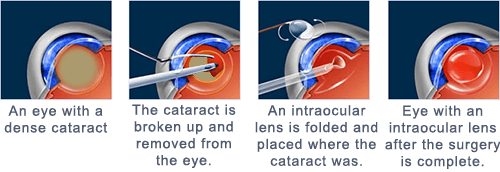What is Cataract Surgery?
At the Boston Eye Group, we offer cataract surgery to help you see properly once again. Cataracts cause your natural eye lens to become cloudy, disrupting your vision. Having a cataract is like looking through a foggy or dusty windshield. Your perceptions of things can be blurry, hazy, or faded in color. The only way to get rid of cataracts is through surgical intervention. Your ophthalmologist at Boston Eye Group will help to choose the best surgical option for you.

Types of Cataract Surgery
Our team at the Boston Eye Group strives to stay on top of the latest advancements in technology and surgical techniques to provide our patients with effective, quality care. Our team was among the first to embrace revolutionary implants for cataract surgery. These include toric lenses to correct astigmatism and multifocal lenses to reduce dependency on glasses at a distance and near.
The types of cataract surgery that we perform at the Boston Eye group are:
Phacoemulsification
With this technique, an ultrasonic oscillating probe is inserted into the eye. This probe breaks up the center of the lens, while this is happening, the fragments are suctioned from the eye. Most of the lens capsule is left behind, but a foldable intraocular lens implant will be placed inside to help focus light onto the retina. The incision used for this is very tiny and does not require any sutures to close it. There is a very short period of downtime, but vision returns quickly.
Femtosecond Laser-Assisted Cataract Surgery (FALCS)
With this technique, a precise laser is used to perform some steps of the surgery before entering the operating room. The laser will make corneal incisions for the surgery and to reduce astigmatism. The laser will also open the cataract (capsulotomy) and soften the lens, allowing the surgeon to use less ultrasound in the eye.
Posterior Capsulotomy
This is a laser procedure that is sometimes necessary after cataract surgery. During cataract surgery, part of the anterior capsule is removed. This remainder of the capsule holds the lens implant in place. The posterior capsule remains fully intact. But sometimes, the posterior capsule loses its clarity after cataract surgery. When this happens, a laser can be used to restore normal vision.
Recovery from Cataract Surgery
After your cataract surgery, you may need to use eye drops. Your doctor will let you know when to stop using eye drops after the surgery. You mustn’t rub or press on your eye. Your ophthalmologist may give you something to cover the eye to protect it. Recovery from cataract surgery is relatively quick and simple. Most patients notice an immediate improvement in your vision from the surgery. Most patients notice an immediate improvement in your vision from the surgery and return to most activities of daily living the next day.
Schedule Your Consultation
If you are noticing signs or symptoms of cataracts, then speak with an eye care professional at the Boston Eye Group. We can help to find the right treatment for you to restore your vision. To make an appointment, call the office or fill out an online form.
